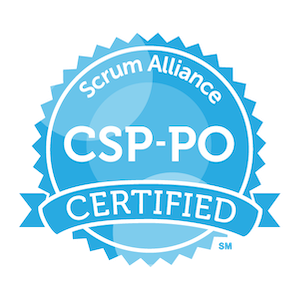Agile techniques have become the cornerstone of adaptability and customer-centricity in the ever-changing field of project management. The Product Owner’s job is fundamental to Agile and serves as a keystone for efficient product development. To succeed in this crucial function, professionals can achieve the Certified Scrum Product Owner (CSPO) certification, which is a shining example. This manual delves into the deep meaning of CSPO certification, elucidating its function within Agile, advantages it confers upon people and companies, and practical applications. Come along on a trip to discover how CSPO certification can empower Agile excellence and change things.
The Role of Product Owner in Agile
In Agile, a product owner plays a crucial and diverse function that calls for a special set of abilities to connect the development team and business stakeholders. The following is a thorough explanation of the main duties and facets of the Agile Product Owner position:

Visionary Leadership
- Responsibility: The Product Owner is the visionary leader, responsible for defining the product vision and ensuring it aligns with the overall business strategy.
Stakeholder Communication
- Responsibility: Fostering communication to guarantee that development teams, stakeholders, and other pertinent parties have a common understanding of the objectives and priorities of the product.
Backlog Management
- Responsibility: Maintaining a prioritized product backlog, a dynamic list of features, enhancements, and fixes, reflecting the product’s requirements and priorities.
Requirement Definition
- Responsibility: Collaborating with stakeholders to define clear and concise user stories, ensuring that development teams understand the end-users’ needs.
Continuous Prioritization
- Responsibility: Iteratively prioritizing and refining the product backlog based on feedback, changing business priorities, and market dynamics.
Acceptance Criteria
- Responsibility: Defining clear and testable acceptance criteria for user stories, providing the development team with the necessary details to meet user expectations.
Decision Making
- Responsibility: Making informed and timely decisions on product features, functionality, and priorities based on business goals and user feedback.
Risk Management
- Responsibility: Identifying and mitigating risks associated with product development, ensuring that potential issues are addressed proactively.
Team Collaboration
- Responsibility: Collaborating closely with the development team throughout the product development lifecycle, providing guidance, feedback, and support.
Product Increment Review
- Responsibility: Participating in regular sprint reviews to evaluate the product increment, gather feedback, and make adjustments to the backlog as needed.
Release Planning
- Responsibility: Contributing to release planning, ensuring that the product roadmap aligns with business objectives and customer expectations.
To ensure that the product not only satisfies business goals but also provides value to end customers, the Product Owner essentially acts as a bridge between the development team and business stakeholders. Leadership, communication, and analytical abilities are all necessary for this function in order to successfully traverse the challenges of Agile product development.
What is CSPO Certification?
The Certified Scrum Product Owner (CSPO) certification is a widely accepted credential that attests to a person’s competence in carrying out the responsibilities of a Product Owner in an Agile setting. The CSPO certification, provided by Scrum Alliance, gives professionals the skills and methods required to lead productive product development.
Why Pursue a CSPO Certification?
- Deepening Agile Knowledge: CSPO certification goes beyond the basics, offering in-depth insights into Agile principles and practices specific to the Product Owner role.
- Market Relevance: As Agile practices become integral to businesses, CSPO certification enhances your marketability, signaling to employers your commitment to Agile excellence.
- Effective Collaboration: CSPO training emphasizes collaboration and communication skills, essential for successful product development within Agile frameworks.
CSPO Certification Benefits
Individual:
- Enhanced Skill Set: CSPO certification equips individuals with the skills needed to excel as Product Owners, from backlog management to stakeholder collaboration.
- Career Advancement: Certified Product Owners are in high demand, and CSPO certification can open doors to career advancement and new opportunities.
Organization:
- Improved Product Delivery: CSPO-certified professionals contribute to more effective and customer-focused product development, leading to improved delivery.
- Agile Transformation: CSPO certification supports organizational Agile transformation by fostering a culture of collaboration, innovation, and customer satisfaction.
Tips for Success in CSPO Certification
- Active Participation: Engage actively in CSPO training sessions, workshops, and discussions to maximize your learning experience.
- Apply Learning: Apply CSPO concepts in real-world scenarios to reinforce your understanding and build practical skills.
CSPO Certification vs. Other Agile Certifications
Other Agile certifications, such as PMI-ACP and Certified ScrumMaster (CSM) address other responsibilities within the Agile framework, while CSPO concentrates on the Product Owner job. The Agile role you want to play and your career aspirations will determine which certification is best for you.
Real-World Impact of CSPO Certification
A CSPO certification frequently yields observable benefits, such as improved customer satisfaction and expedited product development procedures. Businesses that employ CSPO-certified individuals benefit from increased teamwork, a quicker time to market, and a greater emphasis on value delivery.
Conclusion
All things considered, the CSPO certification is a very useful tool for people and companies that are exploring the Agile landscape. In a time when companies are adopting Agile approaches more enthusiastically, the importance of having a skilled Product Owner is immeasurable. The CSPO certification acts as a spark, empowering individuals to not only fulfil but also exceed the demands of this vital Agile position. It fosters a culture of continuous improvement, teamwork, and unwavering dedication to customer-centric procedures. By earning your CSPO certification, you may start along the path to Agile excellence and open up new opportunities in the field of Agile product development.
FAQs’
1. Does CSPO increase salary?
A. Yes, obtaining a Certified Scrum Product Owner (CSPO) certification can potentially increase one’s salary. CSPO certification is a valuable credential in the Agile and Scrum framework, demonstrating expertise in product ownership and Agile practices. Many organizations recognize and value individuals with CSPO certification, often leading to improved career opportunities and enhanced earning potential. However, the extent to which it influences salary can vary based on factors such as location, industry, experience, and the overall demand for Agile professionals in the job market. It’s advisable to research salary trends in your specific field and region for a more accurate assessment.
2. What is CSPO used for?
A. A Certified Scrum Product Owner (CSPO) plays a crucial role in Agile and Scrum frameworks. The CSPO is responsible for representing the interests of key stakeholders and ensuring that the development team delivers maximum business value. Here are some key purposes and responsibilities associated with the role of a CSPO:
- Product Vision: The CSPO is responsible for creating and communicating a compelling product vision that aligns with the organization’s goals and priorities.
- Prioritization: They prioritize the product backlog based on business value, market needs, and stakeholder feedback.
- User Stories: The CSPO collaborates with the development team to create user stories and acceptance criteria, providing a clear understanding of the desired functionality.
- Stakeholder Communication: The CSPO maintains open communication channels with stakeholders, gathering feedback and ensuring that their needs are understood and addressed.
- Decision-Making: They make decisions regarding the release of product increments, ensuring that each release delivers the most valuable features.
- Adaptability: The CSPO is adaptive, responding to changes in requirements, priorities, or market conditions throughout the development process.
- Collaboration: Collaboration with the Scrum Master, development team, and other stakeholders is crucial for the success of Agile projects.
- Continuous Improvement: The CSPO is involved in retrospectives and continuous improvement efforts to enhance the team’s effectiveness and the product’s success.
3. Can I get a job after CSPO?
Yes, obtaining a Certified Scrum Product Owner (CSPO) certification can enhance your employability and open up job opportunities in Agile and Scrum environments. CSPO certification demonstrates your understanding of the Agile framework and your ability to effectively play the role of a Product Owner.




























